King of The Hill: Mockery of Values
King of the Hill, set in a fictional Texas town, portrays the Hills’ everyday lives. Hank Hill constantly deals with sometimes crazy issues of his family and friends, while attempting to stay true to his values. The Hills’ values are part of their personalities, which are questioned or ridiculed. Wayne E. Baker notes that “values are concepts people use to make choices, to decide courses of action, to explain and justify behaviors, to judge and be judged” [1]. Values are behavioral choices people make in their lives. Michelle Maiese defines values as a person’s behavioral traits. “When two groups have radically different ways of making sense of human life, it is likely that actions regarded by one side as good and prudent will be perceived by the other as evil or foolish” [2]. Maiese’s definition of values shows what choices people believe are right or wrong. Maiese’s definition acknowledges a variation of behavioral traits within society that result in different values. King of The Hill does acknowledge different values in its portrayal of specific issues. John Altschuler, King of the Hill’s executive producer, states that “some of our biggest laughs come from [Hank’s] just saying, ‘Huh?” [3]. It is King of the Hill’s focus on characterisation, as implied by Altschuler, where the series questions and ridicules values in specific scenarios.
4. Square Peg (Season One, Episode Two)
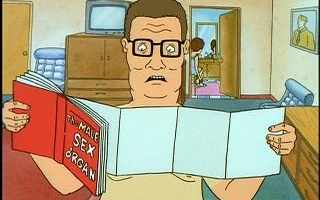
Square Peg sees Hank and Peggy confront their sexual anxieties, after their son Bobby tells them about a school-run sex education program. Hank is particularly restrictive about showing Bobby anything of a sexual nature, even before Hank knows about the sex education program. Peggy rubs Hank’s back when Bobby walks in. “Not in front of the B-O-Y!”, Hank exclaims as he rushes to put his shirt on. Hank’s restrictiveness, even in innocent moments, underlines his apprehension of acknowledging sex. This is emphasised when Bobby asks Hank and Peggy to sign the acceptance form for the sex education program. Hank immediately rips up the acceptance form and is disgusted over school-run sex education, believing it is the parents’ responsibility to teach their children. Hank and Peggy stare at each other awkwardly, creating a hilarious moment of their sex-related fears as Hank and Peggy’s values are seen as ridiculous.
Square Peg leads to repetitive scenes where Hank and Peggy have to deal with sex-related topics. Hank is continuously horrified at the prospect of sex education. “He’s only been out of yours for eleven years”, he tells Peggy regarding her womb. It is another hilarious moment, mocking Hank’s reserved nature. Meanwhile, Peggy has to deal with social prejudice as well as her own anxieties. When Peggy attends Bobby’s baseball game, she discusses sex education with numerous mothers. The mothers are very conservative about sex education. “You poor, poor woman”, Peggy responds to the mothers’ conservatism. While Square Peg creates comedy by questioning values, it also contains serious moments where sex education is argued as a benefit for children. Square Peg‘s sincere portrayal of sex continues as Peggy overcomes her own unease of sex by reading out words like “penis” and”vagina” to give herself confidence, with added humor by Hank’s shocked reaction. Hank and Peggy eventually overcome their anxieties, reflecting their change in attitudes and dissolving part of their values.
3. Bobby Slam (Season Two, Episode Ten)
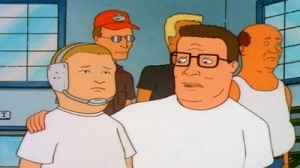
Bobby Slam explores Hank’s need to fulfill the traditional father role, by vicariously living through Bobby’s wrestling ambitions. King of the Hill always portrays Hank as a father who wants to instill male gender traits into Bobby. “What a great time in a boy’s father’s life”, Hank responds when he finds out about Bobby’s wrestling. Strict gender roles are part of Hank’s values, so it is not surprising Bobby Slam mocks Hank’s self-absorbed attitude. This plot point is interlinked with Peggy becoming substitute gym teacher for female students at Bobby’s school. Connie, Bobby’s female friend, becomes interested in wrestling which challenges ideas of gender. Peggy in her typical head-strong manner encourages Connie and decides to supervise her in wrestling. This stirs sexist attitudes in Coach Kleehammer (the male gym teacher) and Hank. Kleehammer reluctantly allows Connie into wrestling tryouts. However, Kleehammer places Bobby and Connie against each other in a qualifying match.
Hank and Peggy become conflicted regarding gender. “We were so close!”, Hank exclaims disappointingly due to his embarrassment over Bobby’s wrestling, feeling it is tainted by Connie’s admission. Hank’s disappointment relates to his views on gender, which are being mocked. Hank’s behavior is further mocked when he goes to extreme lengths in training Bobby. This continues to show Hank’s vicarious attitude as hilariously pathetic. Bobby and Connie understand the flaws of gender roles and use their qualifying match to compete in the WWE style, making a mockery of athletic wrestling to annoy Kleehammer. This makes Hank realise his flaws on views on gender, that it should not interfere with others’ ambitions.
2. Aisle 8A (Season Four, Episode Five)
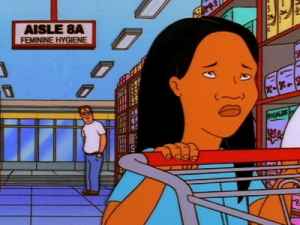
Aisle 8A echoes Hank’s previous sexual anxieties from Square Peg. Connie stays with the Hills whilst her parents are away on a business trip. However, Connie unexpectedly has her first period. Hank is left to deal with Connie’s predicament. Throughout Aisle 8A, Hank is the center of many hilarious and awkward moments. Hank is initially unable to deal with Connie’s predicament, so rings his mother for advice. Yet Hank is unable to tell his mother anything. “I couldn’t even tell my own mother, and she is such a lovely woman”, Hank later tells Peggy. Hank’s sombre delivery stemming from his awkwardness regarding sexual topics is meant to create a comical moment.
Hank’s values continues to create awkward humor as what would be normal for most adults to deal with, Hank’s nervousness causes needless problems. “We’re sure a long way from automotive”, Hank tells Connie as they walk towards Aisle 8A. Hank’s comment mocks his behavior in only wanting to undertake masculine activities and not deal with feminine problems, portraying his personality humorously due to his awkwardness. Hank’s attitude regarding Connie’s predicament is never shaken even after the event, such as when he deals with Bobby’s questions on the matter. “Bobby, if we’re going to get though this, you cannot ask me questions like that”. Aisle 8A continues to mock Hank’s anxieties for his reluctance to deal with feminine issues, even as an adult.
1. Yankee Hankee (Season Five, Episode Ten)
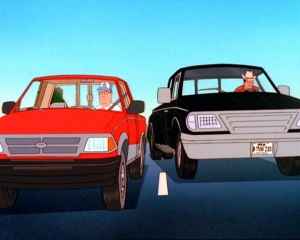
A recurring theme in King of The Hill is Hank and his friends’ Texan pride, which Hank feels is an important value. There are countless episodes where Hank and his friends are enthusiastic about upcoming Dallas Cowboy games and hosting barbecues, so it is no surprise when Hank applies for a native Texan license plate. Yet Hank faces a mystery when he cannot locate his birth certificate. Hank at first thinks he may be adopted, engaging fantasy scenarios of famed NFL coach Tom Landry as his father. “Would I have called him coach or sir?”, Hank’s fantasy scenarios are so obscene that King of The Hill is once again mocking Hank’s personality. However, Hank becomes shocked when he finds out his birthplace is New York City.
Hank becomes depressed and is unable to undertake any activities, feeling it “makes me no better than Tony Randall”. Hank’s statement makes him a source of humor as Hank seems ridiculous in his emasculated state, his ideas regarding Texan pride could be viewed as narcissistic. In a Yankee Hankee sub-plot, Hank’s father manipulates him for a far-fetched scheme and leaves Hank at the Alamo, a major part of the Texas revolution. While at the Alamo, Hank learns that Texas revolutionaries came from numerous states, including New York. Hank understands his emasculated mindset is unneeded and makes his mindset flawed, as Texas is multi-regional in its origins.
King of The Hill‘s continuous mockery of values shows why they can sometimes be flawed. King of The Hill‘s criticism of sex-related anxieties, rigid views on gender and vain pride is evident in characters’ values. Hank in particular is a character whose values are rightly questioned. This is further reflected in the Hills’ change in attitudes, such as Hank and Peggy’s realisation of sex education as positive and Hank understanding his Texan pride can be seen as narcissistic. The Hills’ ability to assess themselves and understand their flaws continues to show King of The Hill‘s understanding of traditional values as flawed.
Works Cited
1. Baker., W.E. 2005. America’s Crisis of Values: Reality and Perception. Princeton University Press.
2. Maiese., M. 2003. ‘Moral or Value Conflicts’, beyondintractability.org. [Online][Available From] – http://www.beyondintractability.org/essay/intolerable-moral-differences
3. Richmond., R. 2006. ‘Milestone: ‘King of the Hill”, hollywoodreporter.com. [Online][Available From] – http://web.archive.org/web/20071008120722/http://www.hollywoodreporter.com/hr/search/article_display.jsp?vnu_content_id=1002501636
What do you think? Leave a comment.
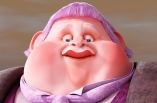




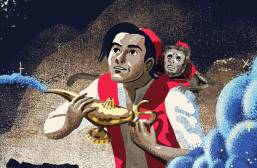





I’ve been watching re-runs on The CW, and it’s such a great show! They really should make a movie!
I love the subtle jokes on this show, like did you ever notice in the episode “Dog Dale Afternoon”, where the guys steal Dale’s lawnmower, when Nancy brings down the box left on their doorstep with the oil filter inside, it’s in a shoebox with Size 16 printed on the side!
This show has held up well. Especially in the later seasons, where they do incorporate a lot more relevant social scenarios, many of which we still are dealing with as a society. The only one that really has aged terribly is the episode dealing with Myspace, for obvious reasons.
Great analyses! I still watch this show and I think it has aged rather well.
I’m just going to say this: this show is Mike Judge’s excuse to get on his soap box. “Beavis and Butt-head” was better because it actually had subtlety. KOTH hammers what Mike Judge wants to tell his viewers worse than Seth MacFarlane.
You do realize that Hank is a fictional character, right? Not all show creators use their characters to express their views. For all you know, Mike Judge could be a huge soccer fan.
The show (and not necessarily Mike Judge, who was just the creator) was satirizing opinions like that, not advocating for them.
OH MY GOD IT’S SO JUICY!
https://www.youtube.com/watch?v=x5-ITF2iI8w
Good piece. As a professor of psychology (development classes), I used Aisle 8A in class to show students about the psychology of puberty.
My favourite part is when hank’s truck breaks, but he doesn’t want to admit it and it stays broken. So wen he has to take mr Strickland to one of their clients, the air con isnt workin and its a hot day, so they start sweating in the truck. So when they get to the clients, mr strickland is almost dead with heat exhaustion, the client asks them if anything is wrong with the supply, he says no, and then faints, while looking really sweaty. So it looks like he’s lying through his teeth. It maks me laugh everytime i think of it. Lmao!!!!
one of the best moments in the show would have to be the over the top scene where a constipated Hank finally takes a dump after having a moment with Peggy.
Great article
King of the Hill struck an almost perfect balance of warmth and positivity against an attitude of total misanthropy.
I think it’s important for shows to address serious qualms about sex-ed, periods, and sex in general in a funny/satirical way. These are real attitudes that many parents in the U.S. have!
Ironically growing up I learned some of the key points of sexual education from King of the Hill. So many good lessons among the comical packaging.
As a somewhat young father, I often think of Hank Hill when one of my daughters comes to ask me a question. I appreciate Hank Hill for not shying away from all the uncomfortable conversations but fighting through the difficulty to better connect with his children, lifestyle and own beliefs.
Oftentimes, the best way to deal with issues like these is through humor, and we can’t help but laugh when we see a character like Hank Hill struggling to deal with them. Someone as clueless as Hank makes us seem quite normal in comparison, and helps us to realize that these issues are just part of every day life, and everyone has their own method of dealing with them. The show could even serve as a humorous method of coping for parents that are currently trying to talk their own children through it. It helps them to laugh through it.
Sometimes the greatest commentary on the flaws in human society come from the most unexpected places.
King of the Hill does address conservative values and raises them to such an extreme that they can be seen as ridiculous. I would dare to say that King of the Hill employs satire to criticize the rigidness of gender roles, sexuality, feminism and national and state pride. Your article hits all these points good job man!
Your article highlights the reasons I think many viewers continue watching King of the Hill. The formula of making a family deal with their underlying issues through outrageous events caused by themselves or their close friends is an effective way of putting light on some pretty regular issues everyone has to deal with at some point. It’s almost as if we are learning from their comical mistakes without even realizing that we are learning anything at all. It’s the best.
Thanks rheagunn
Excellent article about an excellent show. From the mid-90s FOX lineup, I’ve always gravitated towards King of the Hill as certainly being the most human of its brethren. I think your article is a wonderful analysis of the show. Well done.
One of my favourite aspects of King of the Hill is that, at times, I can’t quite tell if its entirely a satire of small c-conservative sensibilities, a strange sort of celebration of them, or a odd combination of both.
i have always enjoyed the show myself. Dale gribble was my favorite character. I loved that he was this interesting mix of screwball, madness, and tragedy all rolled into one.
I’ve always long thought that King of the Hill watch a great commentary, or at least spoof on the popular notions of what it means to the stereotypical southern, conservative, Texan, patriotic American. It was always a great show.
I loved this show but I always thought the values were a little weird. Hank was almost ashamed to talk about things in front of Bobby. He really wanted to protect him. I think it’s better to learn from your family than another teen or something. I guess having pride about where you live is normal but it was never my thing. I never really cared about all the values though. The show was just great, with or without all that.
A good essay. I remember the episode where Hank shook hands with George W Bush and found it a weak grip. As a result he struggled with whether to vote for him.
Considering the content here both Bush Jr. and Hill have at least one similarity (note the regional place of birth for both).